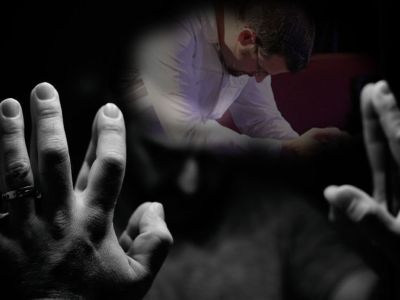I’m Right, You’re Wrong…Now What?
I’m Right, You’re Wrong…Now What?
Okay. So we probably don’t say the title of this article in those exact words, but I can bet you we sometimes think it when we’re in the middle of a heated debate with someone we strongly disagree with! There seems to be more arguing, slander, gossip, and mean-spirited talk among those who consider themselves part of the body of Christ than in any other group of people. I’m all for passion, but when passion crosses the Word of God or the character of Messiah, that’s where we must draw the line and back up. Quick. This article addresses the age-old strategy the enemy has been using as he, once again, attempts to destroy and discredit the people of the Book.

Religious people can be overly zealous, unpredictable, and, many times, run the Christian race like jack-rabbits: zig-zagging all over the place, completely unable to run in a straight line and oftentimes ending back up right where they started. We say that we shouldn’t be like the Pharisees and yet we judge and crucify one another with such zeal that you would think we walk around with a Bible in one hand and a hammer in the other just in case someone gets out of line.
We have somehow gotten the idea that we are God’s policemen and that it’s our duty to point out every speck of sin in our brother’s eye that we “know” WE don’t have. This is despite the forest of trees growing from our own retinas, complete with enough thorns and thistles to provide homes for entire species of unclean animals. And if our brother doesn’t listen to us because of our enthusiastic, “spirit-led” approach, we put their sin online in hopes of garnering support for our position, thinking that we’re some sort of spiritual superhero sent here to save earthlings from doctrinal heresy. After all, isn’t it our responsibility to expose sin and warn others of their impending doom and false theology? It’s one thing to defend a position with respect, honor, and love. It’s quite another to attack the individual behind the belief system, just for the sake of staying in the superior position that we sometimes hold in our minds.
Oh how far we have fallen from the love of Christ! Did Yeshua condemn the woman who had five husbands or did He lovingly approach her and encourage her to go and sin no more, never knowing whether she took his advice or not? When Thomas doubted, Yeshua didn’t scold or rebuke him for his lack of faith; He simply took the opportunity to increase it by letting him feel His nail-scarred hands. Even Nicodemus (a Pharisee) and Zacchaeus (a tax collector) were extended tremendous patience and compassion; Yeshua saw in their hearts that they were humble enough to learn. And what about Judas? He walked with his Rabbi for three years and the entire time his Master KNEW he would be His betrayer, yet He said nothing. Who does that? Yeshua chose to minister to him anyway, all the way up to the very end.
Where is the love of Christ anymore? Where is the patience, kindness, gentleness, and self-control that was shown to everyone the Messiah came in contact with? You might be thinking to yourself, “What about how He treated the Pharisees? He wasn’t so kind there.” Great question. There are some well-intentioned believers who take those examples and use them as their justification for how they should treat those who don’t listen to or agree with their perspective on Scripture. But there are several important differences that must be understood before taking such a bold stance:
1. The Pharisees were sitting in a position of authority and were representing, quite literally, Yeshua Himself who was the Word (Torah) made flesh. This meant that they had, knowingly or unknowingly, submitted themselves to His authority since He wrote the Law. He had the right to rebuke them so harshly because, as the living Word and Yahweh in the flesh, He was, in fact, their King, whether they recognized it or not. Unless someone has given us permission to judge them and keep them accountable, we simply do not have the authority.
2. The Pharisees also had no desire to learn from Yeshua, but were jealous of His following. Yeshua boldly approached those who claimed to be teachers of the Law but did not live it out. There was less grace for those who placed themselves above others at their expense. Today, hypocrites still invoke strong emotions for those who are trying to keep His Word. The difference between us and Yeshua is that He had no sin, no specks in His eyes. He could point out sin because He had none. As believers, if we choose to point out someone’s sin in any way, shape, or form, we should be careful to judge the situation in love, for we will be judged in the very same manner (Mt. 7). So unless you don’t mind your own shortcomings being broadcast online for the world to see, you might want to take the more biblical approach. 😉
3. The Messiah had the ability to discern the intent of the heart. In other words, He knew the true motive of everyone He came in contact with. He could see why they were doing what they were doing. This is how He could rebuke one Pharisee and then give grace to Nicodemus; He saw the difference in their hearts. So unless we can absolutely know for sure the motivation and intent of someone’s heart, we should probably just pray for them silently.
4. Yeshua had all the facts and there was no missing information. He could, therefore, judge a situation in full. As a full-time minister, it has been my experience that most people judge when they don’t know all the facts. They THINK they have all the facts, but they don’t know what they don’t know. Proverbs 18:17 says that one person’s side sounds right until he is examined by his neighbor. In other words, we simply cannot judge a situation or someone else until we have all the facts.
For example, a woman might believe that all men are evil and that marriage is designed to put the male in the dominant position so he can rule over her. She might be scripturally wrong but there might be some very strong emotions and experiences that are driving her theology rather than the black and white of Scripture. Your thoughts about and approach to a woman like this might change if you knew she had been raped by her dad and abused by every man she has ever been in a relationship with. Knowing all the facts is critical to making pure judgments if they are to be made at all.
I have learned many spiritual principles during my time in prison. There are over 200 men here from all walks of spiritual life and on many different levels of biblical understanding. It would be easy for me to point out to this person that they’re wrong about this subject and to another that they’re wrong about that topic, but where does that get me? Or them? Instead, I’ve learned to respect where people are and only feed those who hunger for more. Why cast my pearls before swine? And by the way, the term “swine” doesn’t mean “unsaved”; it’s a Hebrew idiom that means you should not try to share a new truth with someone who is comfortable with their own. If a pig is at home living in its own mess, all the revelation (pearls) in the world will not move it. You’re wasting your time.

Did you know that it’s okay for someone to be wrong? If not, then you need to learn to be okay with it because you are not their Master. They don’t report to you. It is only the Holy Spirit that opens the eyes of the blind. If you attempt to share the truth with someone and they don’t receive it, allow them the respect to do so. It’s okay! Love them anyway and learn the humble art of “agreeing to disagree.” Maybe you’re called to just plant the seed. Maybe they’re actually hearing you loud and clear but are too proud to admit you’re right. Or perhaps your approach is not in love so the Spirit within them will not allow them to accept it. Or it just might not be the right time for that person to see that particular truth. Bottom line? We must stop playing God and trying to convert everyone to our point of view and stop throwing a fit when they don’t buy what we’re selling.
So why do we have such a hard time with people who don’t agree with us? One simple word: PRIDE. Most folks are not trying to “share” their thoughts about what they believe because they’re genuinely concerned about the spiritual position of others; they’re trying to “convince” others of their viewpoint from the position of superiority they hold in their own minds. Anyone who attempts to persuade another brother of their revelation for the purpose of maintaining a superior position over him has fallen to the lowest, most depraved form of human reality. A sage once said that one who attempts to bestow knowledge outside the context of ultimate love has actually taken on the characteristics of the accuser in all his forms, forcing every last word to point to his superior position. It is the accuser of the brethren who stands before the Throne, arrogantly pointing out our sin while conveniently forgetting his part in it. The person who dogmatically judges another because they do not agree with his position has unknowingly taken the same attitude the ancient Pharisees who accused Christ did. And so a new generation of Pharisees is born.
Friends, let’s give others the right to be right where they’re at with the Lord. Our job is to show them the love of Messiah and share our nuggets as the Holy Spirit prompts. There were, no doubt, many sinners around Yeshua, but He chose to approach only the woman at the well that day. There were trees with fruit all around Him but He used the Spirit’s discernment to know which was ripe enough to be touched by His hand.
The character of Messiah is love, joy, peace, patience, kindness, goodness, faithfulness, gentleness, and self-control. Anything else is of the enemy. The power of God is found in His love, not in His correct theology. Even HE waits for another thousand years after Yeshua comes back before initiating the Great White Throne Judgment. If the true Judge chooses to wait ’til that day to judge the living and the dead, shouldn’t we give people more than a few minutes before we unfriend them and slander them online?
At the end of your life, may people proclaim that you lived a life in the image of Christ, that you loved with no return, that you gave grace to those who might not have deserved it, that you kept His commandments to the best of your ability, and that you lived humbly before your God.
Give people room to grow. Share what you believe the Father is showing you but always reserve for yourself the right to be wrong. Don’t judge unless you’re in a position of authority to do so or unless you wake up one day sitting at the right hand of the Father. (If that happens feel free to judge away). And lastly, love at all times and treat people in the exact way you would want to be treated if you were on the other side of the aisle. After all, if we can’t get the top two commandments right, the rest will have nothing to hang from. Think about it.
P.S. Please share this article and post it everywhere online you see people bickering, arguing, insulting each other, and not displaying the love and patience of Christ. Don’t stand by and watch the body of Christ tear itself apart. Share the love of Messiah and make a difference to bring healing to our land!
Jim Staley

Jim Staley
About The Author
Jim’s life’s desire is to help believers everywhere draw closer to the Father by understanding the truth of the scriptures from their original cultural context (a Hebraic perspective) and to apply them in faith for today.











